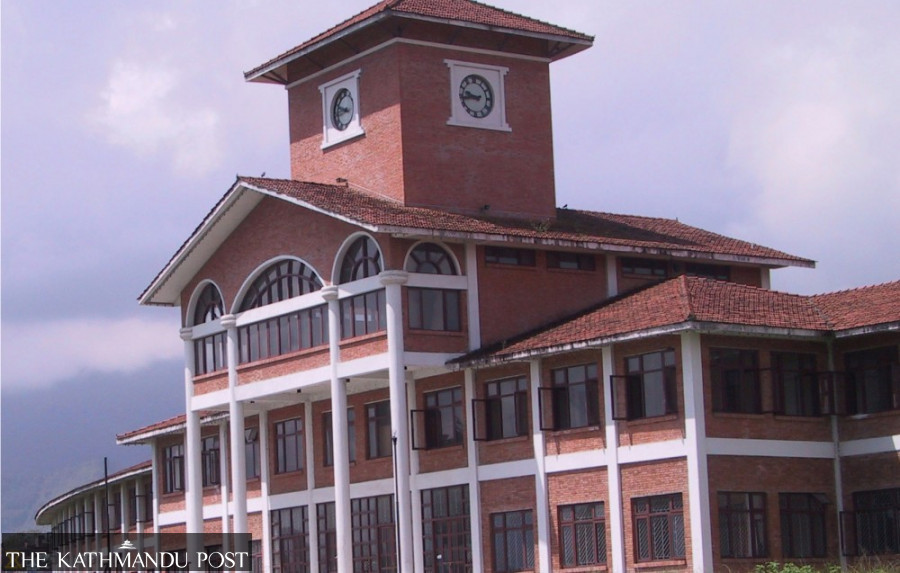National
Maintaining health safety protocol during exams is impossible, colleges say
There is a risk of the virus situation going out of control again if precautions are not taken, health experts warn.
Shuvam Dhungana
On June 24, Tribhuvan University published the routines for the stalled exams of various bachelor’s level programmes. As per the time table, bachelor’s second year exams were held on July 20 while the first year exams (old batch) are scheduled to start on July 25.
The authorities had issued a notice to assure students that the exams would be conducted adhering to all safety protocols. However, according to the students, there were no safety protocols at exam centres.
Anisha, 22, whose exam centre was at New Millenium College in Sukedhara, Kathmandu said she was surprised to see a crowd of students outside the college gate, waiting to enter inside.
“Hundreds of students had gathered outside the college gate to see the seating plan,” said Anisha, who wished to be identified by only her first name. “Fifteen minutes before the test, the college opened a small gate and the students started pushing one another to enter.”
It seemed like neither students nor college authorities were worried about the Covid-19 pandemic, she added.
According to Anisha, although most of the students were wearing masks, there was no one to monitor social distancing and there were no sanitisers in sight.
The Tribhuvan University has designated as many as 59 exam centres in Kathmandu Valley to conduct first year examinations of various programmes. Almost all colleges have failed to abide by safety protocols and they admit it.
According to Ram Krishna Simkhada, principal of Vinayak Siddha College, Chabahil, it is almost impossible to conduct exams by maintaining social distance and other safety measures as the number of students is very high.
“Almost 400 students from different colleges gather at the exam centre. During such chaos, it’s impossible for us to enforce safety measures,” said Simkhada.
The health safety protocols announced for the exams are impossible to follow, said Simkhada. “If we start seating the students by following the physical distance rule, only 20 students will fit in one class. Adjusting as many as 400 students in one exam centre would become impossible not only in this college but in every college.”
However, according to Shiva Lal Bhusal, the rector of Tribhuvan University, they have increased the number of exam centres to avoid overcrowding and have allowed students to take exams from the nearest centre by informing the TU office.
“Since we cannot monitor everywhere, we have appointed a chairperson at each centre to ensure that the safety protocols are followed,” said Bhusal. “Besides, local authorities also mobilise monitoring officials to ensure the protocols are followed.”
The final exams of various disciplines and programmes at the country’s oldest and largest university were delayed by over a year due to the Covid-19 pandemic, subsequent restrictions in movement and the university’s insistence on holding in-person exams.
Although the university has switched to virtual lectures, it is still reluctant to hold the exams online.
Other universities, including Kathmandu University, Pokhara University and Agriculture and Forestry University, have conducted their exams virtually.
After the exam notice was published by the Tribhuvan University, many students through social media had criticised the plan to conduct in-person exams amid the threat of the pandemic.
Public Health experts have long been warning of a possible catastrophe, as Nepal’s case positivity rate is still too high and the percentage of fully immunised people against the coronavirus is very low at just 4 percent.
According to Dr Sher Bahadur Pun, clinical research chief at Sukraraj Tropical and Infectious Disease Hospital, there is a growing risk of new variants of the virus.
“As many students are not vaccinated due to their category, it’s a huge risk not only for students but their families too,” said Pun. “There is a high risk of the situation going out of control again if proper precautions are not taken.”
Nepal on Saturday reported 2,309 new coronavirus cases taking the nationwide infection tally to 679,017, according to the Health Ministry.
As many as 805 people tested positive in a total of 4,285 antigen tests.
In its regular situation report, the ministry did not mention the death toll over the past 24 hours. It, however, reported 16 Covid-19-related fatalities, which included the number of deaths managed by Nepal Army on different dates.
The nationwide death toll has now reached 9,695. The number of active cases stands at 27,757.
The Tribhuvan University, which has 1,124 affiliate and 61 constituent colleges, is the largest university in the country with over 400,000 regular students. The number of examinees, however, exceeds 500,000 as there are students sitting exams for back papers. The university runs 125 programmes in the bachelor’s and master’s levels.




 21.12°C Kathmandu
21.12°C Kathmandu














